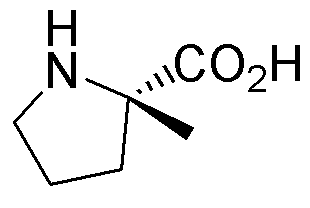L-a-Methylproline is widely utilized in research focused on:
- Pharmaceutical Development: This compound serves as a building block in the synthesis of various pharmaceuticals, particularly in the development of peptide-based drugs. Its unique structure can enhance the stability and bioavailability of drug candidates.
- Protein Engineering: In biochemistry, L-a-Methylproline is used to modify peptide sequences, allowing researchers to study the effects of structural changes on protein function and stability, which is crucial for drug design.
- Material Science: This chemical is explored in the creation of new materials, particularly in polymers where its incorporation can improve mechanical properties and thermal stability, making it valuable for advanced manufacturing.
- Cosmetic Formulations: With its potential skin benefits, L-a-Methylproline is being researched for use in cosmetic products, where it may enhance skin hydration and elasticity, appealing to the beauty industry.
- Amino Acid Research: As a non-standard amino acid, it provides insights into protein folding and function, helping researchers understand diseases related to protein misfolding, which is vital in fields like neurobiology.
General Information
Properties
Safety and Regulations
Applications
L-a-Methylproline is widely utilized in research focused on:
- Pharmaceutical Development: This compound serves as a building block in the synthesis of various pharmaceuticals, particularly in the development of peptide-based drugs. Its unique structure can enhance the stability and bioavailability of drug candidates.
- Protein Engineering: In biochemistry, L-a-Methylproline is used to modify peptide sequences, allowing researchers to study the effects of structural changes on protein function and stability, which is crucial for drug design.
- Material Science: This chemical is explored in the creation of new materials, particularly in polymers where its incorporation can improve mechanical properties and thermal stability, making it valuable for advanced manufacturing.
- Cosmetic Formulations: With its potential skin benefits, L-a-Methylproline is being researched for use in cosmetic products, where it may enhance skin hydration and elasticity, appealing to the beauty industry.
- Amino Acid Research: As a non-standard amino acid, it provides insights into protein folding and function, helping researchers understand diseases related to protein misfolding, which is vital in fields like neurobiology.
Documents
Safety Data Sheets (SDS)
The SDS provides comprehensive safety information on handling, storage, and disposal of the product.
Product Specification (PS)
The PS provides a comprehensive breakdown of the product’s properties, including chemical composition, physical state, purity, and storage requirements. It also details acceptable quality ranges and the product's intended applications.
Certificates of Analysis (COA)
Search for Certificates of Analysis (COA) by entering the products Lot Number. Lot and Batch Numbers can be found on a product’s label following the words ‘Lot’ or ‘Batch’.
*Catalog Number
*Lot Number
Certificates Of Origin (COO)
This COO confirms the country where the product was manufactured, and also details the materials and components used in it and whether it is derived from natural, synthetic, or other specific sources. This certificate may be required for customs, trade, and regulatory compliance.
*Catalog Number
*Lot Number
Safety Data Sheets (SDS)
The SDS provides comprehensive safety information on handling, storage, and disposal of the product.
DownloadProduct Specification (PS)
The PS provides a comprehensive breakdown of the product’s properties, including chemical composition, physical state, purity, and storage requirements. It also details acceptable quality ranges and the product's intended applications.
DownloadCertificates of Analysis (COA)
Search for Certificates of Analysis (COA) by entering the products Lot Number. Lot and Batch Numbers can be found on a product’s label following the words ‘Lot’ or ‘Batch’.
*Catalog Number
*Lot Number
Certificates Of Origin (COO)
This COO confirms the country where the product was manufactured, and also details the materials and components used in it and whether it is derived from natural, synthetic, or other specific sources. This certificate may be required for customs, trade, and regulatory compliance.


